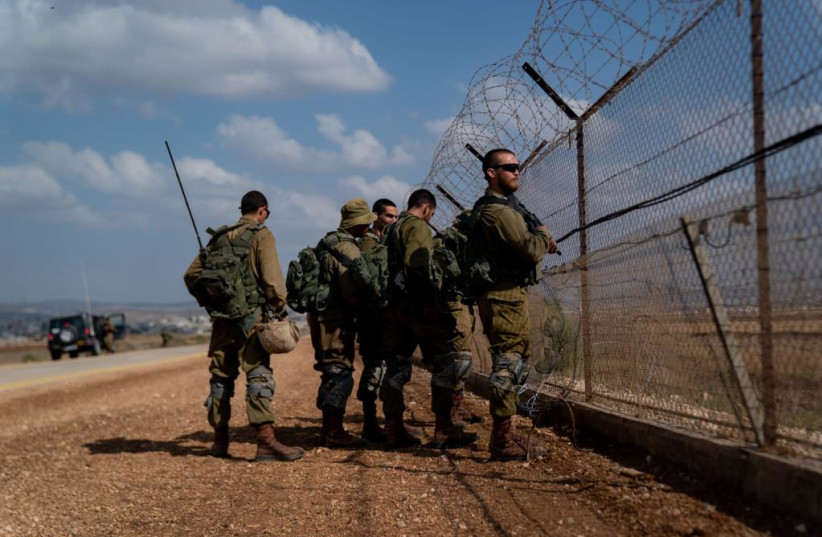I never thought I would agree with anything Hezbollah leader Hassan Nasrallah says. On Monday, the terrorist commander said, “Today, in particular, is the worst day in the history of the entity [Israel], as some of its people say. This is what puts it on the path of collapse, fragmentation, and disappearance.”
No matter where you stand on the internally gut-wrenching issue of judicial reform, nor how passionately you believe in one vision of Israel or another, there is no doubt that the national security implications Israel now faces are nothing short of severe.
This passion comes not from a lack of loyalty, but from conflicting visions of the Jewish state and of Jewish peoplehood. Broadly speaking, one side, the Mizrahim and the settlers – especially those who experienced the literally earth-shattering expulsion from their homes in Gaza – feel that the Ashkenazi elite has an internal system of selecting primarily left-wing judges, and they feel vastly underrepresented. Further, they feel that the Aharon Barak Supreme Court, in his “reasonableness” ruling makes any legislation passed by their elected officials fair game to be overturned by the Supreme Court, whether or not it is an issue of justice, military affairs, domestic, national security, or even foreign policy.
The other side believes that the Supreme Court needs to be there to provide an independent check and balance against a highly politicized legislative branch that may well get carried away with its own power, and forget about the rights of women, minorities, and Arab Israelis. They are afraid that there will in effect be one ruling body with no safeguards to protect democracy. Unlike the United States, Israel has no real distinction between the legislative and the executive branch – and they are afraid to take away the mitigating powers of the judicial branch.
The acute passion has reached such an intensified pitch that earlier this week, over 10,000 reserve officers signed a petition saying that they would refuse to serve when called up. This traverses a well-demarcated red line; a line that every soldier ought to know not to cross.

Yet there is a distinction between participation in a meaningful democratic form of protest and placing the national security of their nation – the only nation that they know and love and have chosen to raise their families in – at severe risk.
How is the judicial reform debate putting Israel at risk?
The IDF is the very backbone of Israel’s survival. It is like Maslow’s hierarchy of values. Food, clothing, and shelter must come first. One’s home and protecting one’s very family must come first.
People are letting their passion blind-sight them. Yet this “other” is their fellow Jew and represents some of those who were forever traumatized by their eviction from their Gaza homes in 2005, that disrupted their lives and destroyed everything they had built and been promised by both the Labor and Likud governments.
It is worth remembering that in 2005, the issue of the Gaza disengagement was brought before the Supreme Court, and 10 of the 15 Supreme Court justices refused to hear the petition of the residents of Gaza, despite Justice Aharon Barak’s wide rubric of “reasonableness.”
As I write this, it is Tisha Be‘av. We are reminded that this is nothing new in our people’s history. We read about how we lost our first and second commonwealths; how it was then – eerily familiar – a vicious war of Jew against Jew. We are reminded, once again, of the lessons of Judeo-Roman historian Flavius Josephus’s great manifesto, The Jewish War. We are reminded of more recent tragedies in modern Jewish history, such as the tragic sinking of the Altalena, a ship loaded with weapons and men of the Irgun in the very early days of Israeli statehood which was fired upon by the Israeli Defense Forces, leading to the loss of almost 40 Jewish lives.
When our enemies – such as Iranian-backed Hezbollah – see these horrific internal divisions and demonization among Jews, they can hardly suppress their delight. It is more than just gleeful emotions, however. These emotions have been translated into emboldened actions.
On July 16, Hezbollah released a propaganda video of its elite fighting unit, Radwan, attacking Israeli communities and taking Israeli civilians hostage. In early July, Hezbollah followed this by setting up two tents a few dozen meters inside Israeli territory. (After Israel complained to the UN peacekeeping force there, UNIFIL, one of the tents has been removed).
On July 25, armed Hezbollah fighters crossed the border into northern Israel. They crossed over “the blue line,” an area that had been clearly demarcated on June 7, 2000, as the “unofficial border between Lebanon and the Israeli Golan Heights.” On June 26th, Hezbollah conducted military exercises on its border with Israel and shot down two Israeli drones.
Hezbollah has an arsenal of approximately 150,000 missiles, of which several hundred have been converted into precision-guided missiles, and it is itching for a war. It is backed by Tehran, which now has at least 60 kg. of highly enriched uranium, enough for several nuclear weapons. According to the Foundation for Defense of Democracies, there are no fewer than 19 Iranian-backed terrorist groups in the disputed territories, putting every Israeli city and civilian at risk. And the Palestinian Authority has no legitimacy on the street, whatsoever.
I never thought I would agree with anything Hassan Nasrallah says. But now is not the time for another gruesome, self-destructive fragmentation and debate. It is five minutes to midnight, and the national security implications are far too grave.
The writer is founder and president of the Endowment for Middle East Truth (EMET).
